 Ah, yes, Sidney Pink. A name synonymous with “quality.” You may not know the name but believe you me, you know his work. This is the man who found the money to give us that great, humanitarian gift, Bwana Devil…in 3-D. And who could forget the rollicking good time (*cough*) that was Sidney’s next picture, Angry Red Planet (which he co-wrote)? Heck, even if you have forgotten (even if all of the above was not to you but stump-jumping jibber-speak), trust me on this one thing: you’ll remember Reptilicus. For about twenty-four hours. This was Pink’s second directorial credit, a worthy follow-up to 1953’s I Was a Burlesque Queen, earned in tandem with former sound designer Poul Bang. Pink also wrote the screenplay together with Angry Red Planet scribe Ib Melchior (who would go on to at least get “story” credit for Death Race: 2000), so this film really, truly can be lain entirely at Mr. Pink’s feet. Few men can say they single handedly ruined a country’s daikaiju genre, but Sidney, were he alive today, would walk away with that brass ring. No contest.
Ah, yes, Sidney Pink. A name synonymous with “quality.” You may not know the name but believe you me, you know his work. This is the man who found the money to give us that great, humanitarian gift, Bwana Devil…in 3-D. And who could forget the rollicking good time (*cough*) that was Sidney’s next picture, Angry Red Planet (which he co-wrote)? Heck, even if you have forgotten (even if all of the above was not to you but stump-jumping jibber-speak), trust me on this one thing: you’ll remember Reptilicus. For about twenty-four hours. This was Pink’s second directorial credit, a worthy follow-up to 1953’s I Was a Burlesque Queen, earned in tandem with former sound designer Poul Bang. Pink also wrote the screenplay together with Angry Red Planet scribe Ib Melchior (who would go on to at least get “story” credit for Death Race: 2000), so this film really, truly can be lain entirely at Mr. Pink’s feet. Few men can say they single handedly ruined a country’s daikaiju genre, but Sidney, were he alive today, would walk away with that brass ring. No contest.
We critical folk liked to bandy about words like “forgettable,” “unremarkable,” and “crap,” but rare is the film that readily falls into all three categories. I suppose that’s a sign of something…not quality, to be sure…but something, nevertheless.
Chances are you’ve seen Reptilicus before, even if only while browsing through your satellite provider’s Guide screen. The damn thing has remained a staple on the Sci-Fi Channel, edging other, better giant monster movies right off the network after it sold out. Before that it played on countless Saturday afternoons to an audience of latch-key kids. Before that: the drive in. (You remember drive-ins, too, right?) Yet, somehow, I managed to avoid seeing Reptilicus in its entirety until just last night. Go figure. {More}
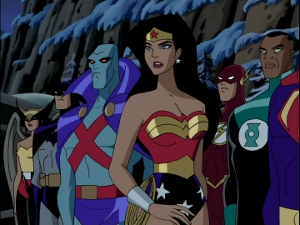 The Justice League of America, in its most rarefied form, represents a powerhouse of D.C. comics heaviest hitters, originally created as a marketing gimmick in 1960 by that great creator of gimmicks and Godhead of the silver age, the comics writer Gardner Fox. But you already knew that, didn’t you?
The Justice League of America, in its most rarefied form, represents a powerhouse of D.C. comics heaviest hitters, originally created as a marketing gimmick in 1960 by that great creator of gimmicks and Godhead of the silver age, the comics writer Gardner Fox. But you already knew that, didn’t you?
 Plenty of critics dismissed
Plenty of critics dismissed 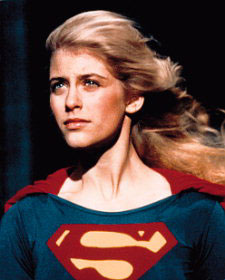 Both comic book and movie begin with Argo City, a civic center blown free from the planet Krypton with its gravity and atmosphere completely intact (take that, laws of physics). I’m gonna go out on a limb and assume that the Action Comics team threw in a few pictures with this story. Not so here. Opening with a “bang” is one of the first things to go out the window, despite this film’s nominal connection with the wider Superman franchise. After all, why show us something we can just talk about it? And have Peter O’Toole stand around, waving his magic wand?
Both comic book and movie begin with Argo City, a civic center blown free from the planet Krypton with its gravity and atmosphere completely intact (take that, laws of physics). I’m gonna go out on a limb and assume that the Action Comics team threw in a few pictures with this story. Not so here. Opening with a “bang” is one of the first things to go out the window, despite this film’s nominal connection with the wider Superman franchise. After all, why show us something we can just talk about it? And have Peter O’Toole stand around, waving his magic wand?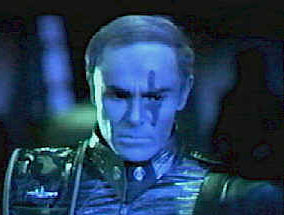 ou have to wonder what goes on in Roger Corman’s smooth, smooth head.
ou have to wonder what goes on in Roger Corman’s smooth, smooth head. Moving on, we find writer/director/producer John Sayles, whom I first encountered through my mother and the 1997 jungle bloodbath, Men with Guns. But let’s not even go there.
Moving on, we find writer/director/producer John Sayles, whom I first encountered through my mother and the 1997 jungle bloodbath, Men with Guns. But let’s not even go there.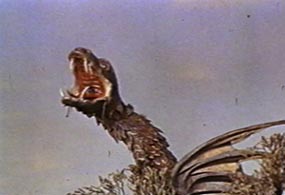 Ah, yes, Sidney Pink. A name synonymous with “quality.” You may not know the name but believe you me, you know his work. This is the man who found the money to give us that great, humanitarian gift, Bwana Devil…in 3-D. And who could forget the rollicking good time (*cough*) that was Sidney’s next picture, Angry Red Planet (which he co-wrote)? Heck, even if you have forgotten (even if all of the above was not to you but stump-jumping jibber-speak), trust me on this one thing: you’ll remember Reptilicus. For about twenty-four hours. This was Pink’s second directorial credit, a worthy follow-up to 1953’s I Was a Burlesque Queen, earned in tandem with former sound designer Poul Bang. Pink also wrote the screenplay together with Angry Red Planet scribe Ib Melchior (who would go on to at least get “story” credit for Death Race: 2000), so this film really, truly can be lain entirely at Mr. Pink’s feet. Few men can say they single handedly ruined a country’s daikaiju genre, but Sidney, were he alive today, would walk away with that brass ring. No contest.
Ah, yes, Sidney Pink. A name synonymous with “quality.” You may not know the name but believe you me, you know his work. This is the man who found the money to give us that great, humanitarian gift, Bwana Devil…in 3-D. And who could forget the rollicking good time (*cough*) that was Sidney’s next picture, Angry Red Planet (which he co-wrote)? Heck, even if you have forgotten (even if all of the above was not to you but stump-jumping jibber-speak), trust me on this one thing: you’ll remember Reptilicus. For about twenty-four hours. This was Pink’s second directorial credit, a worthy follow-up to 1953’s I Was a Burlesque Queen, earned in tandem with former sound designer Poul Bang. Pink also wrote the screenplay together with Angry Red Planet scribe Ib Melchior (who would go on to at least get “story” credit for Death Race: 2000), so this film really, truly can be lain entirely at Mr. Pink’s feet. Few men can say they single handedly ruined a country’s daikaiju genre, but Sidney, were he alive today, would walk away with that brass ring. No contest.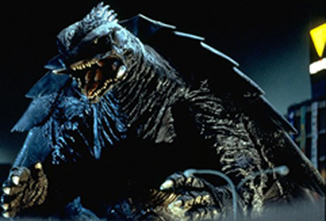 Until 1995, Gamera was the joke: about as low as you could go in the land of Giant Monsters…unless you went to the real out-of-the-way backwaters, like Hong Kong, or South Korea. He was, at best, a Godzilla rip-off, and even nerds like us look down on those. The fire-breathing clown palled around with the kids when he should have been out handing Tokyo its ass. Oh, sure, he saved the world…but from what?
Until 1995, Gamera was the joke: about as low as you could go in the land of Giant Monsters…unless you went to the real out-of-the-way backwaters, like Hong Kong, or South Korea. He was, at best, a Godzilla rip-off, and even nerds like us look down on those. The fire-breathing clown palled around with the kids when he should have been out handing Tokyo its ass. Oh, sure, he saved the world…but from what? 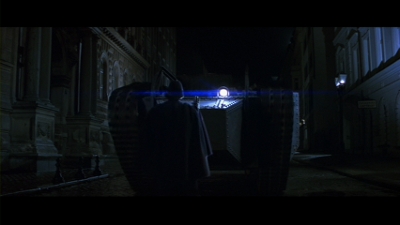 The next industry Uncle Tom who calls Alan Moore out for
The next industry Uncle Tom who calls Alan Moore out for 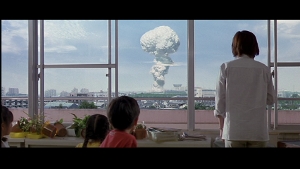 Like most middle-aged men, Godzilla suffers from a deplorable excess of emotional baggage. After fifty years of high highs and low lows his identity has become erratic. Toho, Godzilla’s production company, is currently scrambling to field the movie that will return Godzilla to his rightful place as champion of the giant monster action extravaganza.
Like most middle-aged men, Godzilla suffers from a deplorable excess of emotional baggage. After fifty years of high highs and low lows his identity has become erratic. Toho, Godzilla’s production company, is currently scrambling to field the movie that will return Godzilla to his rightful place as champion of the giant monster action extravaganza.